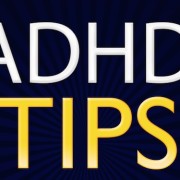ADHD and Oppositional Defiant Disorder (ODD)
Oppositional defiant disorder (ODD) is commonly comorbid, or simultaneously occurring with ADHD. ODD is a problem that first becomes noticeable in the preschool years or during early adolescence. The following information discusses the symptoms and criteria needed for a diagnosis of ODD. Please remember that not all people with ADHD have ODD and vice versa; however, the two commonly occur together.
Of the following list of symptoms, at least 4 must be present for at least 6 months to be diagnosed with ODD. The behaviors must also occur with at least one person who is not a sibling. For children under the age of 5, the behaviors should occur on most days for at least 6 months. For those over 5, the behaviors should occur at least once per week for at least 6 months in order to be diagnosed with ODD. These symptoms must cause distress to oneself or others in close social contact with the person, or it must negatively impact areas of functioning such as school, work, or social situations.
Symptoms:
- Loses temper often.
- Easily annoyed or often touchy
- Frequently angry or resentful
- Often argues with figures of authority, such as adults
- Actively defies authority figures and/or rules
- Annoys others on purpose
- Blames others for his or her misbehavior or mistakes.
- Has been spiteful or vindictive 2 times within the past 6 months.
- If symptoms occur only in one setting (school, home, work, social environment) ODD may be categorized as mild.
- If symptoms occur in 2 settings, ODD may be moderate.
- If symptoms occur in 3 or more settings, ODD may be considered severe.
If you believe that you or a loved one may be struggling with ADHD and/or ODD, please contact Dr. Gordon today!
Contact Dr. Gordon for help with your ADHD. We have treatment and solutions available online, by phone, and in our offices.
written by: Brianna Malinowski, Jay Gordon, Ph.D
American Psychiatric Association. (2013). Diagnostic and statistical manual of mental disorders: DSM-5.



